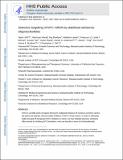Selective targeting of MYC mRNA by stabilized antisense oligonucleotides
Author(s)
Gill, Taylor; Wang, Haichuan; Bandaru, Raj; Lawlor, Matthew; Lu, Chenyue; Nieman, Linda T; Tao, Junyan; Zhang, Yixian; Anderson, Daniel G; Ting, David T; Chen, Xin; Bradner, James E; Ott, Christopher J; ... Show more Show less
DownloadAccepted version (2.184Mb)
Open Access Policy
Open Access Policy
Creative Commons Attribution-Noncommercial-Share Alike
Terms of use
Metadata
Show full item recordAbstract
MYC is a prolific proto-oncogene driving the malignant behaviors of numerous common cancers, yet potent and selective cell-permeable inhibitors of MYC remain elusive. In order to ultimately realize the goal of therapeutic MYC inhibition in cancer, we have initiated discovery chemistry efforts aimed at inhibiting MYC translation. Here we describe a series of conformationally stabilized synthetic antisense oligonucleotides designed to target MYC mRNA (MYCASOs). To support bioactivity, we designed and synthesized this focused library of MYCASOs incorporating locked nucleic acid (LNA) bases at the 5'- and 3'-ends, a phosphorothioate backbone, and internal DNA bases. Treatment of MYC-expressing cancer cells with MYCASOs leads to a potent decrease in MYC mRNA and protein levels. Cleaved MYC mRNA in MYCASO-treated cells is detected with a sensitive 5' Rapid Amplification of cDNA Ends (RACE) assay. MYCASO treatment of cancer cell lines leads to significant inhibition of cellular proliferation while specifically perturbing MYC-driven gene expression signatures. In a MYC-induced model of hepatocellular carcinoma, MYCASO treatment decreases MYC protein levels within tumors, decreases tumor burden, and improves overall survival. MYCASOs represent a new chemical tool for in vitro and in vivo modulation of MYC activity, and promising therapeutic agents for MYC-addicted tumors.
Date issued
2021-11-25Department
Harvard-MIT Program in Health Sciences and Technology; Broad Institute of MIT and Harvard; Koch Institute for Integrative Cancer Research at MIT; Massachusetts Institute of Technology. Department of Chemical Engineering; Massachusetts Institute of Technology. Institute for Medical Engineering & ScienceJournal
Oncogene
Publisher
Springer Science and Business Media LLC
Citation
Gill, T., Wang, H., Bandaru, R. et al. Selective targeting of MYC mRNA by stabilized antisense oligonucleotides. Oncogene 40, 6527–6539 (2021).
Version: Author's final manuscript